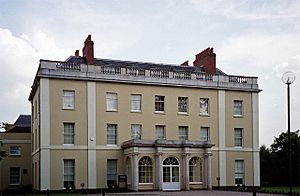James Chase (apothecary) facts for kids
James Chase (born around 1650 – died June 23, 1721) was an important person in England. He lived at Westhorpe House in Little Marlow, Buckinghamshire.
James Chase was an apothecary, which was like a pharmacist who prepared and sold medicines. He was also a Whig politician. This means he was part of a specific political group in England. He served in the English and British Parliament from 1690 to 1710. From 1690, he was the official apothecary for three different monarchs: King William III, Queen Anne, and King George I.
Early Life and Family
James Chase was the oldest son of John Chase. His mother was Elizabeth Soane. His family had a long history of serving the royal family. James's father and even his grandfather were also royal apothecaries.
James went to Christ Church, Oxford when he was 15 years old. He married Elizabeth Box on November 17, 1677. In 1684, he bought land in Little Marlow. He then built Westhorpe House there during the time Queen Anne was ruling.
Royal Apothecary
James Chase was a member of the Worshipful Society of Apothecaries. He even became the leader of this group for a year.
When his father passed away in 1690, James took over his role. He became the official apothecary for King William III in June 1690. This was a very important job. He earned a good salary and was given a place to live in Whitehall, a royal area. He continued to serve as the royal apothecary for Queen Anne and later for King George I.
Political Journey
In 1690, James Chase was elected as a Member of Parliament (MP). He represented the area of Great Marlow in Parliament. He was very popular in his area. He was re-elected many times without anyone running against him. This happened in 1695, 1698, and in both elections of 1701. He was also re-elected without opposition in 1702 and 1705.
In 1706, he was given a special job helping sick and wounded people. However, he resigned from this role the next year. In 1708, he was re-elected as an MP again, this time after a competition. As a Whig, he voted for important laws. For example, in 1709, he supported a law to allow people from other countries to become British citizens. In 1710, he voted on another important issue regarding Dr. Sacheverell.
Later in 1710, there was a problem with his election result. He decided to give up his claim to the seat. He tried to get elected again in 1715 but was not successful.
Later Life and Legacy
James Chase passed away on June 23, 1721. He did not have any children. He left his property and estate to his wife. He also left some of his property to his cousin's oldest son, Stephen Chase.
 | Janet Taylor Pickett |
 | Synthia Saint James |
 | Howardena Pindell |
 | Faith Ringgold |


